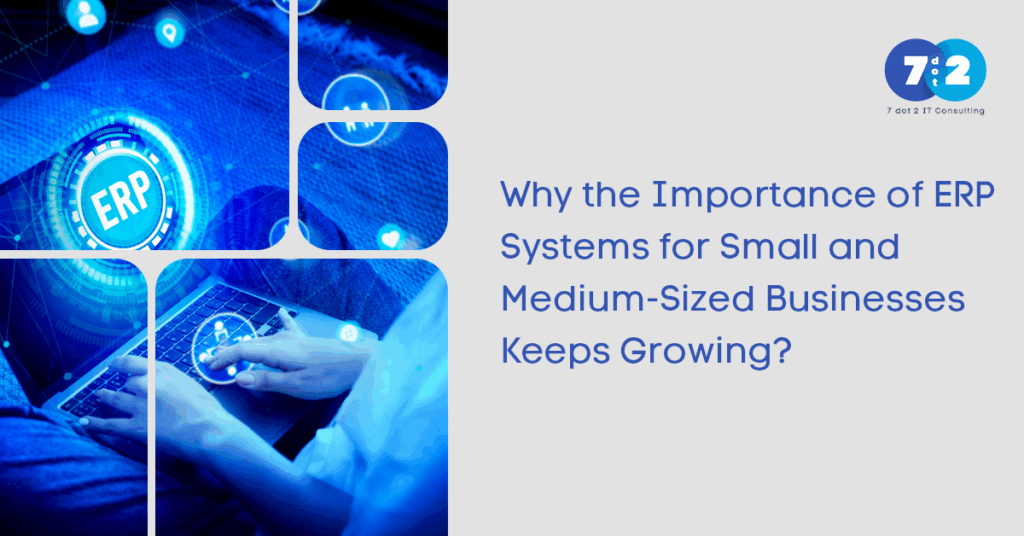Why the Importance of ERP Systems for Small and Medium-Sized Businesses Keeps Growing?
Posted on : 01 Aug 2025 at 17:29 pm, by Puneet Aggarwal, Founder 7 dot 2 IT Consulting

7 dot 2 IT Consulting recognizes the relationship between growth and efficiency. This is why we believe the Importance of ERP Systems for Small and Medium businesses is so significant. From improving operational efficiency and unleashing strategic thinking, ERP is making a measurable difference in this competitive market.
What Is ERP and Why Does It Matter?
An ERP (Enterprise Resource Planning) system combines all the core business functions – sales, inventory, finance, HR, and procurement – into one system. For small and medium-sized companies, this means moving from disconnected and fragmented spreadsheets and independent tools to an integrated system. An ERP will provide you with increased visibility, decreased manual effort, and more informed thinking.
Why Small and Medium‑Sized Businesses Need ERP Systems?
- Easier Taxation and Compliance: The ERP system has made GST and other tax compliances easy, where returns can be filed accurately and on time with less effort.
- Increased Productivity: ERP systems will automate repetitive tasks such as processing orders, entering invoices, and tracking inventories. This allows your team to spend more time on strategic initiatives.
- Cost Savings: Automation, accurate forecasting, and reduced error rates lead to lowering inventory holding costs, fewer delays, and a positive ROI.
- Less Reliant On People: With built-in field processes/systems that depend less on an individual, and also the continuity of business increases.
- Uniform Data Quality: Instead of different sectors or departments handling their data, a centralized system promotes a higher level of accuracy, prevents duplicate data, and makes sure everyone’s on the same numbers.
What are the benefits of ERP Systems for SMEs?
1. Real-Time Insights & Data Accuracy
ERP consolidates data department-wide, increasing accuracy and facilitating real-time dashboards. This transparency provides for quicker, data-informed decisions.
2. Streamlined Operations & Simplified Processes
Integrate the whole process, and your ERP solution will help streamline and automate it for further efficiency and traceability, from procurement to fulfillment.
3. Enhanced Financial & Inventory Management
ERP enables a more accurate financial overview, cash flow, and stock levels while preventing shortages, overstock, and accounting mistakes.
4. Improved GST & Tax Compliance
ERP applies tax automatically, maintains compliance, and easily provides the necessary reporting, reducing the risk during reconciliations and audits.
5. Better Collaboration & Transparency
One source of truth, all departments on the same page, increases accountability and cross-team efficiency.
6. Better Process Control & More Independent
All processes are structured and built into the ERP system, mitigating against errors through staff turnover and siloed work streams.
7. More Than Just Data Entry, Analysis, But Smarter
Instead, it automatically captures, stores, and organizes business data, freeing up workers to move from number-crunching to trend analysis.
How the Importance of ERP Systems for Small and Medium‑Sized Businesses Plays Out in Real Life?
Operational Efficiency: Automation eliminates the possibility of human error and accelerates processes – sales, purchase orders, attendance, and invoicing.
Financial Visibility: Real-time monitoring of cash flow and expenses offers improved financial discipline.
Scalable Growth: As you grow, ERP grows with you, add inventory, CRM, or HR modules when your business requires them.
Enhanced Decision-Support: Real-time dashboards give you transparency and insight that enables agility in your business and planning.
Choosing the Right ERP with 7 dot 2 IT Consulting
- Assess Your Business Needs – We help you identify your determining factors in your business: Finance, Operations, Inventory, or Customer Management.
- Choose Core Modules First – Start with your highest priority (e.g., Finance + Sales) and develop your modules as time goes on.
- Select Cloud-Based Deployment – Cloud-based ERP may be the best option for small- and medium-sized businesses mindful of costs: Speed of deployment, limited IT infrastructure overhead, and access from anywhere.
- Plan for Adoption & Training – Buy-in is key to success. Our change management practice ensures a successful go-live experience.
- Measure ROI – Track important metrics: Time savings due to reduced manual processing, faster order intake and execution, reduced inventory cost, improved margins.
Conclusion
At 7 dot 2 IT Consulting, we continue to preach (yes, preach) about how and why ERP Systems are Important for Small and Medium-Sized Businesses, because the benefits are real – less manual work, more (and easier) compliance, and sharper decision-making. ERP software systems eliminate person dependency, provide reliable data quality, and even automate tax reporting (GST), enabling your business to be proactive rather than reactive. From optimizing functions to fostering superior, more sustainable growth, ERP systems are not mere software to implement but a strategic asset.
Here at 7 dot 2 IT Consulting, we help small and medium-sized businesses implement the proper ERP solutions that fit the company’s immediate needs, budget, and growth plans. The time to gain control over your business processes and set the stage for your long-term success is now!/p>
